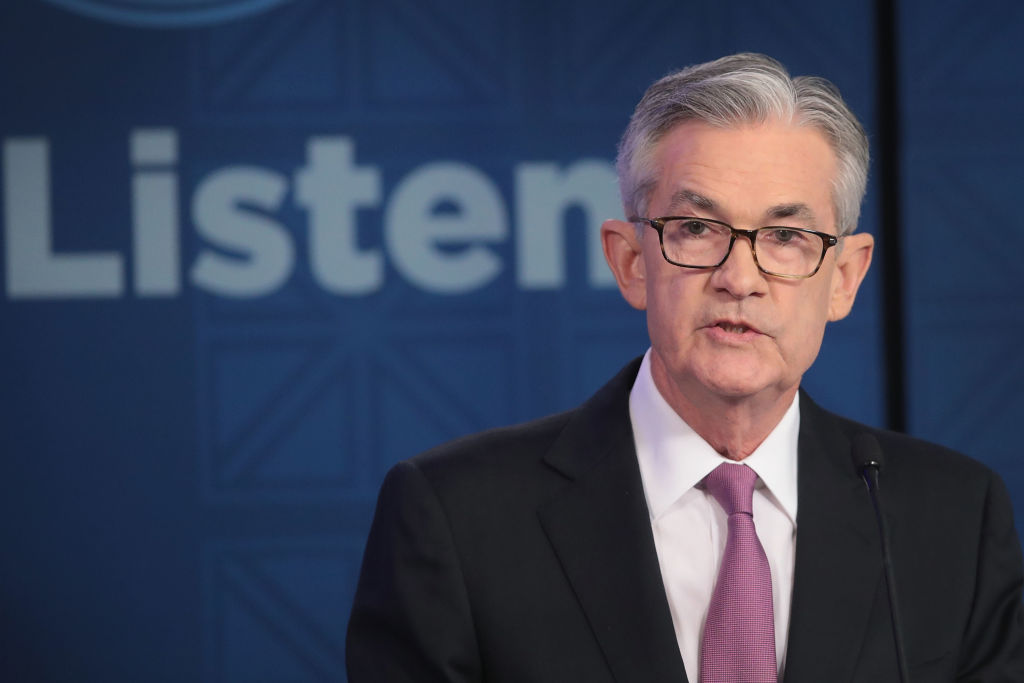Fed chair: As world evolves, 'cyber risk' becomes greater threat


A free daily email with the biggest news stories of the day – and the best features from TheWeek.com
You are now subscribed
Your newsletter sign-up was successful
Federal Reserve Chairman Jerome Powell says the chances of another global financial crisis like the one that hit in 2008 is "very, very low." Instead, he told 60 Minutes during an interview that aired Sunday night, "the risk that we keep our eyes on the most now is cyber risk."
The economy is "ever changing," Powell explained to correspondent Scott Pelley. "The globalization of the economy and technology have enabled manufacturing to take place all around the world. It's very hard for people in wealthy countries to raise prices or to raise wages. It's hard for workers to raise wages when wages can move overseas. It's just a different economy."
When Pelley asked Powell about the chances of the world experiencing "a systemic breakdown like in 2008," the chairman said the prospect of having a "breakdown that looked anything like that, where you had banks making terrible loans and investment decisions and needing and having low levels of liquidity and weak capital positions, and thus needing a government bailout, the chances of that are very, very low. Very low."
The Week
Escape your echo chamber. Get the facts behind the news, plus analysis from multiple perspectives.

Sign up for The Week's Free Newsletters
From our morning news briefing to a weekly Good News Newsletter, get the best of The Week delivered directly to your inbox.
From our morning news briefing to a weekly Good News Newsletter, get the best of The Week delivered directly to your inbox.
The world evolves, though, and as such "the risks change as well," Powell said. "And I would say that the risk that we keep our eyes on the most now is cyber risk." The scenarios in this case involve "a large financial institution" losing the ability to "track payments that it's making," Powell said. "Where you would have a part of the financial system come to a halt, or perhaps even a broad part. And so, we spend so much time and energy and money guarding against these things. There are cyber attacks every day on all major institutions now. That's a big part of the threat picture in today's world."
A free daily email with the biggest news stories of the day – and the best features from TheWeek.com
Catherine Garcia has worked as a senior writer at The Week since 2014. Her writing and reporting have appeared in Entertainment Weekly, The New York Times, Wirecutter, NBC News and "The Book of Jezebel," among others. She's a graduate of the University of Redlands and the Columbia University Graduate School of Journalism.
-
 How the FCC’s ‘equal time’ rule works
How the FCC’s ‘equal time’ rule worksIn the Spotlight The law is at the heart of the Colbert-CBS conflict
-
 What is the endgame in the DHS shutdown?
What is the endgame in the DHS shutdown?Today’s Big Question Democrats want to rein in ICE’s immigration crackdown
-
 ‘Poor time management isn’t just an inconvenience’
‘Poor time management isn’t just an inconvenience’Instant Opinion Opinion, comment and editorials of the day
-
 TikTok secures deal to remain in US
TikTok secures deal to remain in USSpeed Read ByteDance will form a US version of the popular video-sharing platform
-
 Unemployment rate ticks up amid fall job losses
Unemployment rate ticks up amid fall job lossesSpeed Read Data released by the Commerce Department indicates ‘one of the weakest American labor markets in years’
-
 US mints final penny after 232-year run
US mints final penny after 232-year runSpeed Read Production of the one-cent coin has ended
-
 Warner Bros. explores sale amid Paramount bids
Warner Bros. explores sale amid Paramount bidsSpeed Read The media giant, home to HBO and DC Studios, has received interest from multiple buying parties
-
 Gold tops $4K per ounce, signaling financial unease
Gold tops $4K per ounce, signaling financial uneaseSpeed Read Investors are worried about President Donald Trump’s trade war
-
 Electronic Arts to go private in record $55B deal
Electronic Arts to go private in record $55B dealspeed read The video game giant is behind ‘The Sims’ and ‘Madden NFL’
-
 New York court tosses Trump's $500M fraud fine
New York court tosses Trump's $500M fraud fineSpeed Read A divided appeals court threw out a hefty penalty against President Trump for fraudulently inflating his wealth
-
 Trump said to seek government stake in Intel
Trump said to seek government stake in IntelSpeed Read The president and Intel CEO Lip-Bu Tan reportedly discussed the proposal at a recent meeting
